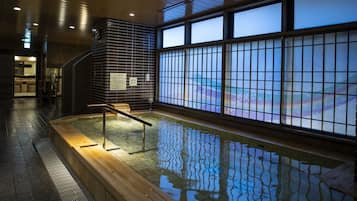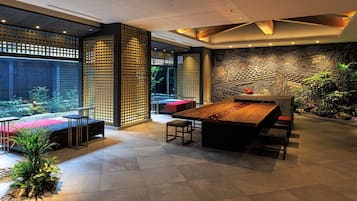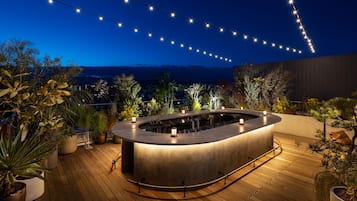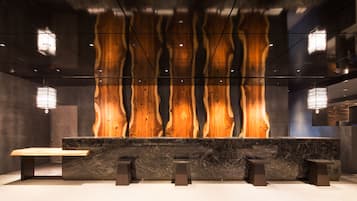How do you enjoy Kyoto on a budget? For starters, the city is steeped in history, which happily means that there are countless historical sites such as shrines and temples to be enjoyed for free or very little money. Without even spending any money, you can walk around famous sightseeing spots like Kiyomizu-dera Temple, Togetsu-bashi Bridge and Maruyama Park, as well as beautiful streets like Sanenizaka and Yasaka-dori that are lined with traditional wooden townhouses.
Kyoto also teaches about its history through many facilities designed precisely for that purpose. The city's many museums, art galleries and observation decks are inexpensive and hugely enjoyable. Here we've compiled a list on ways to save money in Kyoto and some of the best places to visit for great fun without spending too much.
- 1
Kyomizu-dera Temple
A most visited temple in Kyoto
- Économique
- Couples
- Familles
- Histoire
- Photographie
Afficher plus d’infosKiyomizu-dera Temple is the most visited temple in Kyoto. It has many attractions, but one of the spots that you cannot miss is obviously Kiyomizu no Butai, the stage of Kiyomizu, built in front of the main hall of the temple. The top-down view of the city of Kyoto from the stage is well worth a look, while the view of Kiyomizu no Butai itself from the outside is also magnificent. And it’s incredible to think that not even a single nail is used to put together the pillars supporting the stage.
Elsewhere, Zuigu-do Hall offers Tainai-Meguri, meaning 'walking through the womb', in which you walk through the darkness, regarding the underground space of the hall as the womb of Mahapratisara (Daizuigu Bosatsu). The beauty of Kiyomizu-dera Temple is hard to explain in words. But it’s safe to say that this is a temple worth visiting time and again.
Emplacement : 1-294 Kiyomizu, Higashiyama Ward, Kyoto 605-0862, Japan
Téléphone : +81 (0)75-551-1234
Carte - 2
Maruyama Park
Kyoto's oldest park

- Économique
- Couples
- Histoire
- Photographie
Opened in 1886, Maruyama Park is the oldest park in Kyoto. The circuit-style Japanese garden with an area of about 86,000 square metres allows you to walk around and enjoy views of the garden. It’s also known as one of the most magnificent cherry blossom viewing spots and is crowded with people who come to see the flowers during the cherry blossom season. The weeping cherry tree (a cherry tree of the variety called "single white equinoctial week weeping cherry tree") is just spectacular.
The garden with its rich greenery allows you to appreciate the scenic beauty of nature all year round as the seasons change. And don’t miss the event where about 500 bamboo lanterns are placed on the Yoshimizu Stream flowing through the park. The park also has a café called Chorakukan Café, which was completed by renovating the Chorakukan, a building constructed in 1909. You can enjoy afternoon tea and dessert here while soaking yourself in the atmosphere of that time.
Emplacement : 473 Maruyamacho, Higashiyama Ward, Kyoto 605-0071, Japan
Cartephoto de Luca Mascaro (CC BY-SA 2.0) modifiée
- 3
Kyoto National Museum
Explore over a century of Japanese history

- Économique
- Histoire
- Photographie
Kyoto National Museum has over a century of history, collecting and displaying works of art introduced to Kyoto, as well as Japanese and Oriental antiques and cultural treasures. The museum comprises 2 buildings, the Heisei Chishinkan Wing and Meiji Kotokan Hall, with collections are mostly displayed in the Heisei Chishinkan Wing. You'll be able to see National Treasures and Important Cultural Properties like Buddha statues, Buddha paintings and fine arts and crafts that you otherwise might only have seen in textbooks.
The museum regularly holds special exhibitions, outdoor exhibitions and feature exhibitions (check the schedule of events you might be interested in beforehand). Also, it's a good idea to set aside some time to see the impressive Meiji Kotokan Hall, the main gate, the ticket office and outside walls, all of which are designated as Nationally Important Cultural Properties.
Emplacement : 527 Chayacho, Higashiyama Ward, Kyoto 605-0931, Japan
Ouverture : Tuesday–Sunday from 9.30 am to 5 pm (closed on Mondays)
Téléphone : +81 (0)75-525-2473
Cartephoto de Lisa Pinehill (CC BY-SA 2.0) modifiée
- 4
Otagi Nenbutsu-ji Temple
Enter a temple with lush greenery

- Économique
- Histoire
- Photographie
Otagi Nenbutsu-ji Temple is located in the mountains of Oku-Sagano, where time flows peacefully. Entering the lush greenery of the temple grounds, you’ll be welcomed by moss-covered stone statues representing the disciples of Buddha (rakan). There are about 1,200 rakan figures. As you walk around looking at these figures, each with a different expression, you may find yourself breaking into a smile and feeling oddly at peace. Also, both the main hall (Hondo) and the 1,000-Armed Avalokiteshwara who drives away evil spirits (Yakuyoke Senju Kannon), the principal image housed in the Hondo, created in the Kamakura era, have been designated as Nationally Important Cultural Properties.
It’s believed that if you touch the golden Kannon statues housed in the Fureai Kannon-do Hall and Fureai-Ema Hall, you'll be physically and emotionally healed. In the temple, you can also see Sambo-no-Kane built on a mountain slope, which is believed to convey the heart of Buddha with three different sound frequencies of bells. This is a retreat-like temple not far from sightseeing spots such as Togetsu-kyo Bridge. It takes about 5 minutes by taxi from JR Saga-Arashiyama Station.
Emplacement : 2-5 Sagatoriimoto Fukatanicho, Ukyo Ward, Kyoto 616-8439, Japan
Ouverture : Daily from 8 am to 5 pm
Téléphone : +81 (0)75-865-1231
Carte - 5
Yasaka Street

- Économique
- Histoire
- Photographie
Yasaka Street is an approximately 700-metre long approach leading to Yasaka Pagoda. On both sides of the narrow cobblestoned alley, traditional Kyoto townhouses stand side-by-side in a very elegant fashion. Being a popular spot where you can taste the “real Kyoto”, this street has often been featured on TV. The area around Yasaka Street seems to have been in the precincts of Hokan-ji Temple with teahouses standing here since even before the Heian era. In the latter half of the Showa era, urban improvement was carried out, and along with surrounding towns this area was designated as the Gion-mach Minami Historical Landscape Preservation and Improvement District. When you step into Yasaka Street, you can see Yasaka Pagoda ahead of you. Since the neighbourhood has historic sites like Kennin-ji Temple, the oldest Zen temple in Kyoto, and Kongo-ji Temple, the oldest Koshin-do Hall in Japan, this is one of the best areas to stroll and sightsee.
Emplacement : Yasaka, Higashiyama Ward, Kyoto, Japan
Carte - 6
Kyoto Tower
The city's welcoming lighthouse-like icon

- Économique
- Couples
- Familles
- Photographie
Kyoto Tower has become a landmark in Kyoto. The tower stands high in front of JR Kyoto Station as if warmly saying, "Welcome" – not only to people living in Kyoto prefecture but also to domestic and foreign visitors. Since Kyoto is nowhere near the sea, it is said to have been created in the image of a lighthouse illuminating the city of Kyoto. Kyoto Tower is the tallest construction in Kyoto, featuring an observation deck located 100 metres above the ground, commanding a 360-degree panoramic view of Kyoto's historic sites including Chion-in Temple, Kiyomizu-dera Temple and Toji Temple as well as the surrounding urban areas.
Another attraction of Kyoto Tower is Tawawachan-jinja Shrine, located in the highest place in Kyoto. The object of worship (Goshintai) is a shining golden Tawawachan statue, a god of marriage. Ema, tablets on which to write wishes, and Omikuji, drawing sacred lots, are dedicated to Shimogamo Shrine, a shrine with a god of matchmaking, after offering prayers. Kyoto Tower also has a restaurant and a large public bathhouse, so make sure you drop by when you visit Kyoto.
Emplacement : 721-1 Higashishiokojicho, Karasuma-dori Nanajo Sagaru, Shimogyo Ward, Kyoto 600-8216, Japan
Ouverture : Daily from 9 am to 9 pm
Téléphone : +81 (0)75-361-3215
Carte - 7
Domoto Museum of Fine Arts
A go-to place for admiring Japanese arts

- Économique
- Histoire
- Photographie
Domoto Museum of Fine Arts, designed by Japanese painter Insho Domoto, was established in 1966. Later, it was donated to Kyoto Prefecture, and after renovation, the museum reopened in March 2018. The renovation work was done under the concept of making the museum more approachable. The front gate was made wider than before and the front space was also expanded to be used for outdoor events.
In the museum, carefully selected works of art including those created by Domoto are on display in permanent exhibitions. In addition, there are various events like pottery exhibitions, music concerts and gallery tours in which museum curators provide commentaries on art.
Emplacement : 26-3 Hirano Kamiyanagicho, Kita Ward, Kyoto 603-8355, Japan
Ouverture : Tuesday–Sunday from 9 am to 5 pm (closed on Mondays)
Téléphone : +81 (0)75-463-0007
Cartephoto de 663highland (CC BY-SA 3.0) modifiée
- 8
Mandoroyama Observation Platform
Take in magnificent panoramas

- Économique
- Couples
- Photographie
Mandoroyama Observation Platform is an observatory in Mandoroyama Park. From the observatory at the top of the mountain 300 metres above the ground, you can enjoy a magnificent panoramic view of the Kizu-gawa River and an extensive area including the southern area of the cities of Kyoto, Nara and Ikoma. The views from here are said to be the most extensive and beautiful in Kyoto.
At the open space of the observatory, you can sit on a bench or on the lawn, fully enjoying the scenery, and spend a relaxing time listening to the breeze and the sounds of trains running in the distance. There is a single road leading to the top of the mountain, but it’s difficult for vehicles to pass each other, so instead of driving here, you might want to walk up a mountain trail from Yamashiro-Taga Station, the station nearest to the summit. It takes about 60 minutes, but the beauty of the scenery will put a spring in your step.
Emplacement : Taka, Ide, Tsuzuki District, Kyoto, Japan
Téléphone : +81 (0)774-82-6162
Cartephoto de Pumpkin Metal (CC BY 3.0) modifiée
- 9
Otabe Experience Dojo
Make your own sweet Japanese delights

- Économique
- Gastronomie
- Histoire
At the Otabe Experience Dojo, you can try your hand at making Kyoto’s famous sweets. When it comes to Kyoto's famous sweets, many people think of otabe (unbaked rice cake) and raw cinnamon-flavoured confectionary known as yatsuhashi or nama-yatsuhashi. This otabe-making lesson is offered at the factory located in the facility of the main shop where otabe is actually produced. You can make otabe with the same ingredients used in the factory.
Otabe is produced using rice flour made from the Koshihikari brand of rice and spring water that is certified to come from one of Japan’s 100 greatest springs. After mixing the ingredients, otabe dough will be poured onto a steamer. And while it’s steaming, you can enjoy a factory tour. At the Experience Dojo, you can try 3 types of otabe, one with sweet bean paste containing pieces of Azuki bean skin (tsubu-an), another with sweet paste with powdered tea flavour (matcha-an), and the other with sweet bean paste containing chestnuts (kuri-an). All of these can be enjoyed with powdered green tea. This is a very popular place, so it’s good to book well in advance.
Emplacement : 35-2 Nishikujo Takahatacho, Minami Ward, Kyoto 601-8446, Japan
Ouverture : Daily from 9 am to 6 pm
Téléphone : +81 (0)75-681-8284
photo de Nightshadow28 (CC BY-SA 3.0) modifiée
- 10
Kyoto International Manga Museum

- Économique
- Familles
- Histoire
- Photographie
Visiting Kyoto International Manga Museum can be pretty nostalgic, partly because this building was completed by remodelling a former elementary school from the early Showa era. This museum is the fruit of collaboration between Kyoto City and Kyoto Seika University, which has its own Faculty of Manga, opened in November 2006. Here you can enjoy a display of as many as 300,000 pieces of Japanese and international material regarding manga.
It's called a museum, but in some ways, it’s more like a library as you can read manga books as much as you like from the collection of about 50,000 books, ranging from famed masterpieces to the latest publications. With historical materials on manga and Japanese mangas translated into foreign languages on display, you can immerse yourself in the world of Japanese comics and graphic novels to your heart's content. After paying the admission fee, you can re-enter on the day. At the on-site café, you can enjoy the original signed artworks on the wall drawn by manga artists.
Emplacement : Karasuma-dori Oike Noboru, Nijodencho, Nakagyo Ward, Kyoto 604-0845, Japan
Ouverture : Thursday–Tuesday from 10 am to 6 pm (closed on Wednesdays)
Téléphone : +81 (0)75-254-7414
Cartephoto de 利用者:珈琲ルンバ (CC BY-SA 3.0) modifiée


















